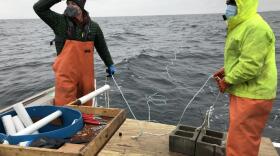Fred Bever
A Columbia University graduate, Fred began his journalism career as a print reporter in Vermont, then came to Maine Public in 2001 as its political reporter, as well as serving as a host for a variety of Maine Public Radio and Maine Public Television programs. Fred later went on to become news director for New England Public Radio in Western Massachusetts and worked as a freelancer for National Public Radio and a number of regional public radio stations, including WBUR in Boston and NHPR in New Hampshire.
Fred formerly was Maine Public Radio’s chief political correspondent from 2001 to 2007 and returned to Maine Public Radio in early 2016 as a news reporter and producer, covering a wide variety of topics across Maine and the region.
-
A new volunteer-created atlas of Maine birds is almost complete. It suggests that since the early 1980s, the complex interplay of global warming, habitat shifts and other factors have brought significant change in the types of birds that are at home in Maine.
-
A federal appeals court is reinstating restrictions on fishing gear in a nearly 1,000 square mile swathe of ocean off Maine's coast. It's a blow to Maine's lobstermen and a victory for advocates for the endangered North Atlantic right whale.
-
Maine's Atlantic puffins took a big hit. Chicks' survival rate plummeted after a record-setting "marine heatwave" disrupted food supplies, showing how climate change is driving vast ecosystem change.
-
Federal regulators on Tuesday morning issued new rules for lobster and other trap-pot fisheries that aim to protect endangered North Atlantic right whales from harmful entanglements.
-
Temperatures are reaching into the 90s in Maine as the Mid-Atlantic and Northeastern U.S. bakes in unseasonably hot weather.
-
A lot of Americans learned to shuck oysters and cook fish at home during the pandemic. Now that restaurants are getting back to normal, there's a supply crunch.
-
A Maine startup is drawing high-profile support for its low-tech plan to soak up carbon emissions. It says its kelp farms will sink to the ocean floor and lock the carbon away for millennia.
-
A Maine startup is drawing high-profile support for its low-tech plan to address climate change. It wants to use kelp farms to capture carbon, then bury it for millennia at the bottom of the sea.
-
Maine's economy relies heavily on summer tourism. With Memorial Day around the corner, many business owners are figuring out when and whether they'll be allowed to reopen.
-
Climate-driven change in the Gulf of Maine is raising new threats that "red tides" will become more frequent and prolonged. But at the same time,...






